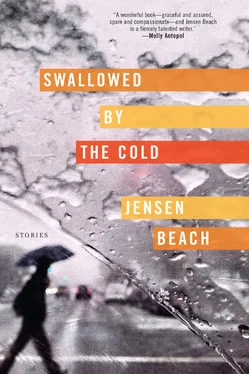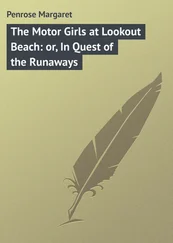He stood in front of the tall orange letter n on the wall beside the row of elevator doors. The doors were polished to a sterile glimmer. Jacob almost wanted to reach out and touch one of them. There was a sandy beach in Grimsta where he and Jenny liked to take the girls to swim when it was warm. A long floating dock had been built out into the water and at its end there was a slide. The beach was sometimes closed if large amounts of algae had been detected in the water, and on those days the slide and dock looked solemn and tragic bobbing up and down in the wind. Every year the algae made people sick, usually children who drank the water. No one had ever died as far as Jacob knew, and the beach closings always struck him as overly cautious and unnecessary. An elevator arrived with a ding. The doors opened to three people. Jacob moved to get on the elevator and then stopped. One of the people, a nurse in green scrubs, put her hand out to hold the door. “I’ll take the next one,” Jacob said. He stared at the three people and they stared back, smiling, until the doors closed.
Another elevator came and again he didn’t get on it, though this one was empty. He thought about algae and lakes and the way his daughters used to fight over which of them would get to dress as Lucia in the St. Lucy’s Day processions at their school. The girls were still young but they’d grown out of such arguments and into others, and he couldn’t remember when or how that had happened. He thought about Henrik Brandt, upstairs with the television and with Jenny, and he thought about the immigrant worker outside in the cold, fighting endlessly against the snow and ice. He felt the fluttering make itself known in his stomach again and put a finger to his pulse to see if he could determine some connection. He stood this way in front of the elevator for a few minutes until a nurse, evidently finishing her day’s work, stopped and, standing too close to him, asked if he felt unwell. He thanked her and went back outside and got in his car. Jenny’s car was still up the row from his. The worker was gone but a fresh layer of sand had been laid over the path and he could still see a hint of yellow peeking through the wet snow. He started the car and turned on the heater. While the car warmed up, he rubbed his hands together and watched the snow. A woman left the hospital, holding a newspaper above her head — a hopeful but pointless gesture in such heavy snow — and he watched her cross to the parking garage. As she passed his car, he followed her with his gaze and his eye caught the swastika again. Over the summer, graffiti like this had started to appear on the glass walls of the bus stop Jacob used every morning. There were swastikas and the double letter s that looked like lightning bolts. The images appeared fresh every Monday when Jacob went to wait for his morning bus. For six weeks straight they were there. Once or twice the symbols had been etched into the glass, but normally they were written in thick black marker or spray paint. The graffiti was usually cleaned up by the middle of the week, but by the following Monday it was always back. Then a neighborhood boy was arrested for riding his motor scooter on a school playground and as suddenly as the graffiti had started appearing on the bus stop, it stopped. For a few days afterward, Jacob and Jenny and their neighbors seemed invigorated with the proof that they lived in a nice neighborhood, a welcoming and safe place, in which this kind of hatred was only ever a prank. He told himself he was going to go back into the hospital and tell the receptionist about the graffiti so that she would tell whoever was in charge of such things that the vandalism needed to be removed. He was so convinced that this was a thoughtful and generous act, and he thought it out in such detail that by the time he was pulling out of the parking garage and easing out into traffic he’d already forgotten what he’d planned to do.
VII
Sometime between using the toilet and getting up from it, his pants had arranged themselves in such a way that the zipper’s pull tab had worked itself into the crease at the bottom of his fly. These were his favorite pants. First, he tugged at the pants, hoping the movement might cause the pull tab to dislodge itself. It didn’t. He dug his finger into his fly, hoping to force it loose. Nothing. Then he pinched the slider, tried to zip it upward. It was difficult to get a good grip and it didn’t budge. On the other side of the bathroom door, Jenny was packing for Copenhagen. Normally, Jenny would have fixed this sort of problem. She was capable and patient, but he didn’t think he could ask for her help without starting another fight. It all made him sad. Lately, that was the only emotion he could feel. Never frustrated, rarely angry, but always sad. He reached down to his fly, determined to free the pull tab by pulling the flap of the fly outward with his left hand as he positioned his right index finger as far behind the pull tab as possible. Still it would not budge. The tip of his finger stung and was tender from the effort. A feeling that reminded him of claustrophobia began to settle in his shoulders and back. He felt warm, and turned on the faucet for a drink. He placed his mouth to the stream of water. The water tasted earthier than normal, as if it might be coming from deep underground.
For the past week Jenny had been trying to convince him of the economic benefits of geothermal heating. Her point, he recalled, gulping down a second mouthful of cold water, was that they were already paying thousands of kronor a month for heating and the geothermal system would, in her words, obliterate that cost. He pulled his mouth from the stream of water to take a breath. It would pay for itself in nine months. She’d read this in the materials that arrived in the mail. Nine months worked out to roughly two winters. The math was sound, no question. Still, there was an obstacle to his coming around to Jenny’s side on the issue. The purchase and installation of the geothermal system were so costly they would need to make financial sacrifices. The new car would have to wait. Same for the four days in Are they took every year during sports week in February with the girls. Same for their annual trip to Thailand. They always started saving for Thailand just after Christmas. He placed his lips back to the stream and drank two or three more gulps of cold water.
In the mirror, he picked at an ingrown hair on his neck. Maybe the geothermal heating system would offer an opportunity for long-term financial savings, plus the chance to stay at home for the whole month of July for once. If he agreed to have the system installed, he could call the installation company and request that they do the work in the month of July. He loved July in Stockholm. Everyone was on vacation. Patio service at his favorite bars stayed open late. They could rent a boat, maybe take it out and camp on an island or two in the archipelago. With a pair of Jenny’s nail scissors he made a small incision at the base of the fly. This allowed him to pry the pull tab upward with his finger. He ran his fingernail the length of the incision. It was a simple thing, but they needed to remember the value they held for each other. This is what she said when she’d proposed the idea of taking a trip, just the two of them. He agreed. He dragged the zipper up and down a few times to check that it hadn’t been damaged. It hadn’t. He held the pants tightly against his chest.
Jenny’s voice came through the door. “It’s five to three. What are you doing in there?” He looked at his watch. The pants had cost him fifteen minutes. He left the bathroom for the bedroom, where Jenny was making neat piles of their clothing. The suitcase was halfway filled. She shook her head at him. “I hope you’re not coming down with that bug Alex had last week.”
Читать дальше











